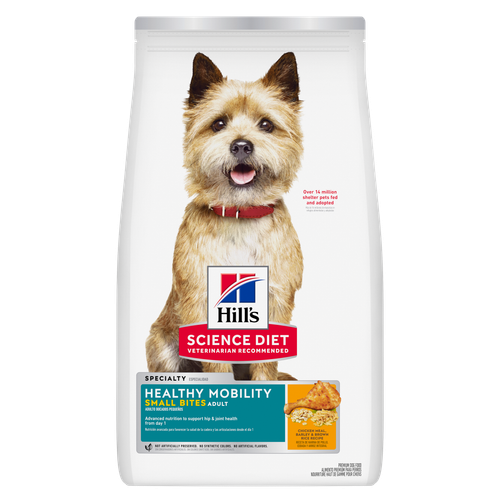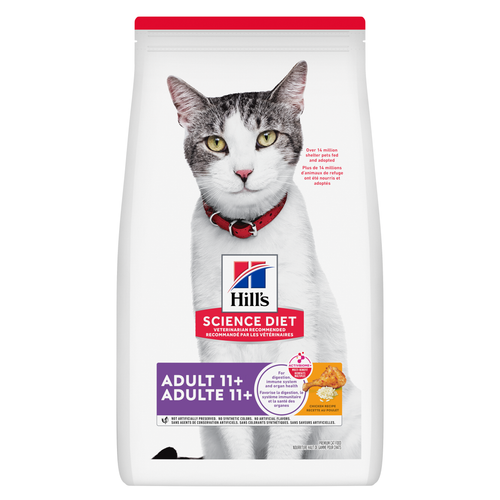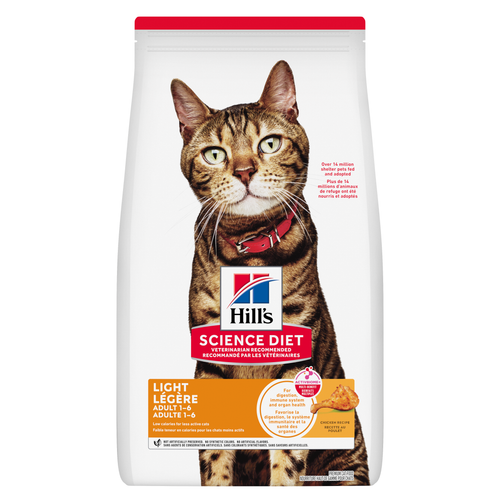
-
Find the right food for your petTake this quiz to see which food may be the best for your furry friend.Find the right food for your petTake this quiz to see which food may be the best for your furry friend.Featured products
 Adult Sensitive Stomach & Skin Small & Mini Chicken Recipe Dog Food
Adult Sensitive Stomach & Skin Small & Mini Chicken Recipe Dog FoodHill's Science Diet Sensitive Stomach & Skin Small & Mini dry dog food is tailored nutrition for Small & Mini dogs while being gentle on stomachs. Nourishes skin & promotes a lustrous coat.
Shop Now Adult Healthy Mobility Small Bites Chicken Meal, Barley & Brown Rice Recipe Dog Food
Adult Healthy Mobility Small Bites Chicken Meal, Barley & Brown Rice Recipe Dog FoodAdvanced nutrition to support hip & joint health from day 1
Shop Now Adult Light Large Breed Chicken Meal & Barley Recipe Dog Food
Adult Light Large Breed Chicken Meal & Barley Recipe Dog Food18% lower calories vs. Science Diet Large Breed Adult
Shop NowFeatured products Adult 11+ Chicken Recipe Cat Food
Adult 11+ Chicken Recipe Cat FoodSupports brain health & beautiful fur. Helps keep immune system, heart & kidneys healthy.
Shop Now Adult Healthy Cuisine Seared Tuna & Carrot Medley Cat Food
Adult Healthy Cuisine Seared Tuna & Carrot Medley Cat FoodDelicious seared tuna paired with tender carrots in a mouthwatering sauce
Shop Now Adult Light Chicken Recipe Cat Food
Adult Light Chicken Recipe Cat Food20% lower calories vs. Hill's Science Diet Adult
Shop Now -
Dog
- Dog Tips & Articles
-
Health Category
- Weight
- Food & Environmental Sensitivities
- Urinary
- Digestive
- Joint
- Kidney
- Dental
- Cancer
-
Life Stage
- Puppy Nutrition
- Adult Nutrition
- Senior Nutrition
Cat- Cat Tips & Articles
-
Health Category
- Weight
- Skin & Food Sensitivities
- Urinary
- Digestive
- Kidney
- Dental
- Stress
- Cancer
-
Life Stage
- Kitten Nutrition
- Adult Nutrition
Featured articles Importance of DHA in your Pet's Food
Importance of DHA in your Pet's FoodLearn about DHA, Docosahexaenoic Acid, a natural omega-3 fatty acid that is essential in the development of the brain and nervous system in cats & dogs.
Read More Water
WaterDiscover why water is the most important nutrient for your dog or cat to live a healthy life. Find out how much water your pet should consume each day.
Read More Antioxidants
AntioxidantsUnderstand the importance of antioxidants in your dog or cat's food, and how they can help protect your pet and keep them healthy.
Read More -


In humans, cataracts are the world's leading cause of blindness. Cataracts in cats are rare, but the disease is still serious; if left untreated, it may lead to blindness. Thankfully, many cases of feline cataracts can be successfully treated.
What Is a Cataract?
Cataracts affect the lens of the eye. The lens helps to focus vision as light that passes through the eye, allowing your cat to see. If this small structure becomes cloudy due to a cataract, it can no longer focus light resulting in blurry vision. The lens is made of mostly proteins and water. Clouding of the lens occurs due to changes in the proteins and lens fibers.
Cataracts in cats are less common than they are in humans and dogs. Furthermore, while humans and dogs can develop cataracts due to diabetes, cats with diabetes typically don't get cataracts. They are also most common among older cats, and Burmese and Himalayan cats are genetically predisposed to the condition. However, cats of all ages and breeds can be affected.
Causes of Cataracts in Cats
Cataracts in cats can develop due to:
- Poor nutrition in early life
- Genetics
- Trauma
- Metabolic disorders
- Radiation
- Inflammation (as with cat cancer, glaucoma, trauma, autoimmune diseases or infection)
- Lens dislocation (typically after trauma or inflammation)
- Cats may also develop cataracts that are related to other diseases such as diabetes or hypertension
Cataracts may develop as a result of uveitis, a type of eye inflammation that can occur as a result of infectious diseases like feline immunodeficiency virus, feline leukemia virus, feline infectious peritonitis and toxoplasmosis. However, it's not always possible to identify the cause of cataracts.
Signs & Symptoms of Cataracts in Cats
Cats are very good at hiding discomfort and vision changes, so it's crucial to look for potential signs of cataracts, such as:
- Hazy or cloudy appearance of one or both eyes
- Behavioral changes (hiding, reduced activity, bumping into familiar objects, difficulty finding their food bowl and/or litter box)
- Disorientation
- Tentative or cautious behavior in unfamiliar places or around stairs
While cataracts aren't considered painful, some conditions that cause them can be. Because of this, a cat with cataracts might also squint or have discharge, redness and swelling around the eye.

Diagnosis of Feline Cataracts
To diagnose cataracts, your veterinarian may perform a variety of tests such as the eye exam and pressure tests. While general practitioners can diagnose most cataracts, they may refer you to a specialist such as veterinary ophthalmologists, who can conduct more sophisticated tests.
These tests may include:
- Advanced eye imaging (including ultrasound)
- Eye pressure testing
- Blood tests for metabolic diseases and infections
If your vet either suspects or diagnoses cataracts in your cat, your veterinarian may recommend that you see a board certified Veterinary Ophthalmologist for further testing and treatment.
Types of Feline Cataracts
Cataracts are classified according to severity and percentage of the lens affected. These are the classifications, according to Animal Eye Clinic:
- Incipient cataracts: Affect less than 15% of the lens
- Immature cataracts: Affect 15% to 100% of the lens; light can still pass through
- Mature cataracts: Affect the entire lens; light passage is impeded
Diagnosing the stage of feline cataracts is essential to selecting the best treatment option.


Tasty Tips
Treating Feline Cataracts
Identifying and addressing the underlying cause of cataracts is the primary approach to treatment. Once this is determined, definitive measures to delay or prevent cataract-related blindness can be considered.
Here are some common approaches:
- Drugs: Steroids and nonsteroidal anti-inflammatory drugs can reduce eye inflammation.
- Surgery to remove the eye (enucleation): Depending on the underlying cause, removal of the eye may be advised, especially if the underlying cause of the cataract causes swelling and pain.
- Surgery to remove the cataract: Another common treatment is replacing the lens of the eye through cataract surgery, performed by a veterinary ophthalmologist.
Cat Cataract Surgery
Removing and replacing the lens with a prosthetic lens is strongly recommended for cats who qualify. If your cat receives cataract surgery, there are important steps you can take to help your cat recover.
For several months after surgery, you'll likely need to apply topical eye medicine. You must also keep your cat in a confined space for at least three weeks, as complications like swelling and bleeding may occur. A pet cone is a must, too.
The Role of Nutrition in Feline Cataracts
Feline cataracts can occur in kittens as a result of inadequate nutrition. A study of hand-reared tigers in Open Veterinary Journal seems to support this. Adequate intake of amino acids (the building blocks of protein) are important for eye development in tigers. Presumably, the same is true when it comes to reducing the risk of cataracts in domestic cats.
What's more, studies in humans, like one in Nutrition Reviews, suggest that the risk of cataracts might be reduced with appropriate nutrition, especially intake of antioxidant vitamins, like vitamin C, as well as lutein, B vitamins, omega-3 fatty acids. A properly balanced pet food for your cat's life stage can often provide the essential nutrients to support your cat's eye health.


Dr. Patty Khuly is an award-winning veterinarian known for her independent thinking, her spirited pet advocacy, her passion for the veterinary profession, and her famously irreverent pet health writing.
Dr. K is an honors graduate of both Wellesley College and the University of Pennsylvania School of Veterinary Medicine. She received her MBA at The Wharton School of Business as part of the prestigious VMD/MBA dual-degree program. She now owns Sunset Animal Clinic, a veterinary practice in Miami, Florida.
Related products

Supports brain health & beautiful fur. Helps keep immune system, heart & kidneys healthy.

20% lower calories vs. Hill's Science Diet Adult

With delicious chunks in a decadent gravy

Delicious seared tuna paired with tender carrots in a mouthwatering sauce
Related articles

Cats are naturally very clean and chances are your kitten will already have learned how to use the litter box from her mother before she comes to live with you.

Discover how to train your cat, starting with very basic first steps that both reward good behavior and discourage the bad.

Discover the benefits of Hill's line of kitten foods and how they provide complete and balance nutrition for growing kittens.

When you adopt a cat, you don't just gain a best friend; you also save her life. Here's why getting a cat from a local animal shelter makes so much sense.

Put your cat on a diet without them knowing
Our low calorie formula helps you control your cat's weight. It's packed with high-quality protein for building lean muscles, and made with purposeful ingredients for a flavorful, nutritious meal. Clinically proven antioxidants, Vitamin C+E, help promote a healthy immune system.
Put your cat on a diet without them knowing
Our low calorie formula helps you control your cat's weight. It's packed with high-quality protein for building lean muscles, and made with purposeful ingredients for a flavorful, nutritious meal. Clinically proven antioxidants, Vitamin C+E, help promote a healthy immune system.

